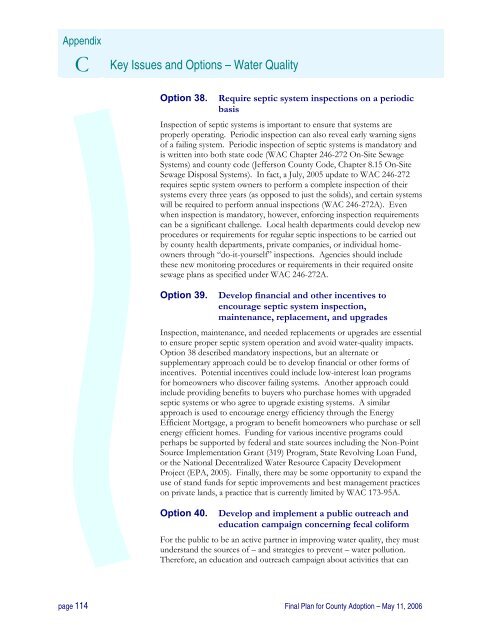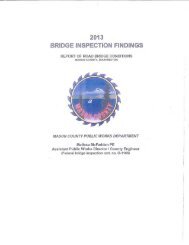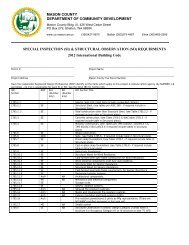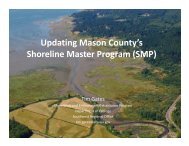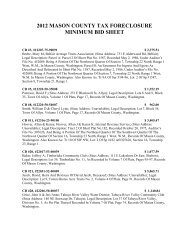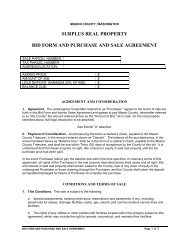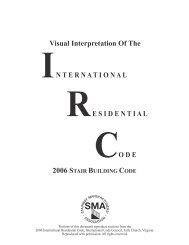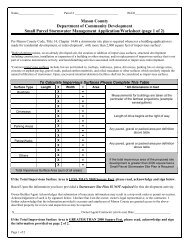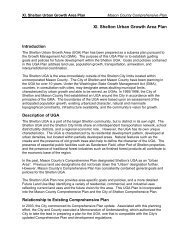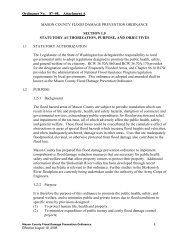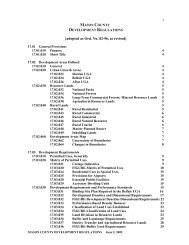Watershed Management Plan - Mason County
Watershed Management Plan - Mason County
Watershed Management Plan - Mason County
You also want an ePaper? Increase the reach of your titles
YUMPU automatically turns print PDFs into web optimized ePapers that Google loves.
Appendix<br />
C Key Issues and Options – Water Quality<br />
Option 38.<br />
Require septic system inspections on a periodic<br />
basis<br />
Inspection of septic systems is important to ensure that systems are<br />
properly operating. Periodic inspection can also reveal early warning signs<br />
of a failing system. Periodic inspection of septic systems is mandatory and<br />
is written into both state code (WAC Chapter 246-272 On-Site Sewage<br />
Systems) and county code (Jefferson <strong>County</strong> Code, Chapter 8.15 On-Site<br />
Sewage Disposal Systems). In fact, a July, 2005 update to WAC 246-272<br />
requires septic system owners to perform a complete inspection of their<br />
systems every three years (as opposed to just the solids), and certain systems<br />
will be required to perform annual inspections (WAC 246-272A). Even<br />
when inspection is mandatory, however, enforcing inspection requirements<br />
can be a significant challenge. Local health departments could develop new<br />
procedures or requirements for regular septic inspections to be carried out<br />
by county health departments, private companies, or individual homeowners<br />
through “do-it-yourself” inspections. Agencies should include<br />
these new monitoring procedures or requirements in their required onsite<br />
sewage plans as specified under WAC 246-272A.<br />
Option 39.<br />
Develop financial and other incentives to<br />
encourage septic system inspection,<br />
maintenance, replacement, and upgrades<br />
Inspection, maintenance, and needed replacements or upgrades are essential<br />
to ensure proper septic system operation and avoid water-quality impacts.<br />
Option 38 described mandatory inspections, but an alternate or<br />
supplementary approach could be to develop financial or other forms of<br />
incentives. Potential incentives could include low-interest loan programs<br />
for homeowners who discover failing systems. Another approach could<br />
include providing benefits to buyers who purchase homes with upgraded<br />
septic systems or who agree to upgrade existing systems. A similar<br />
approach is used to encourage energy efficiency through the Energy<br />
Efficient Mortgage, a program to benefit homeowners who purchase or sell<br />
energy efficient homes. Funding for various incentive programs could<br />
perhaps be supported by federal and state sources including the Non-Point<br />
Source Implementation Grant (319) Program, State Revolving Loan Fund,<br />
or the National Decentralized Water Resource Capacity Development<br />
Project (EPA, 2005). Finally, there may be some opportunity to expand the<br />
use of stand funds for septic improvements and best management practices<br />
on private lands, a practice that is currently limited by WAC 173-95A.<br />
Option 40.<br />
Develop and implement a public outreach and<br />
education campaign concerning fecal coliform<br />
For the public to be an active partner in improving water quality, they must<br />
understand the sources of – and strategies to prevent – water pollution.<br />
Therefore, an education and outreach campaign about activities that can<br />
page 114 Final <strong>Plan</strong> for <strong>County</strong> Adoption – May 11, 2006


